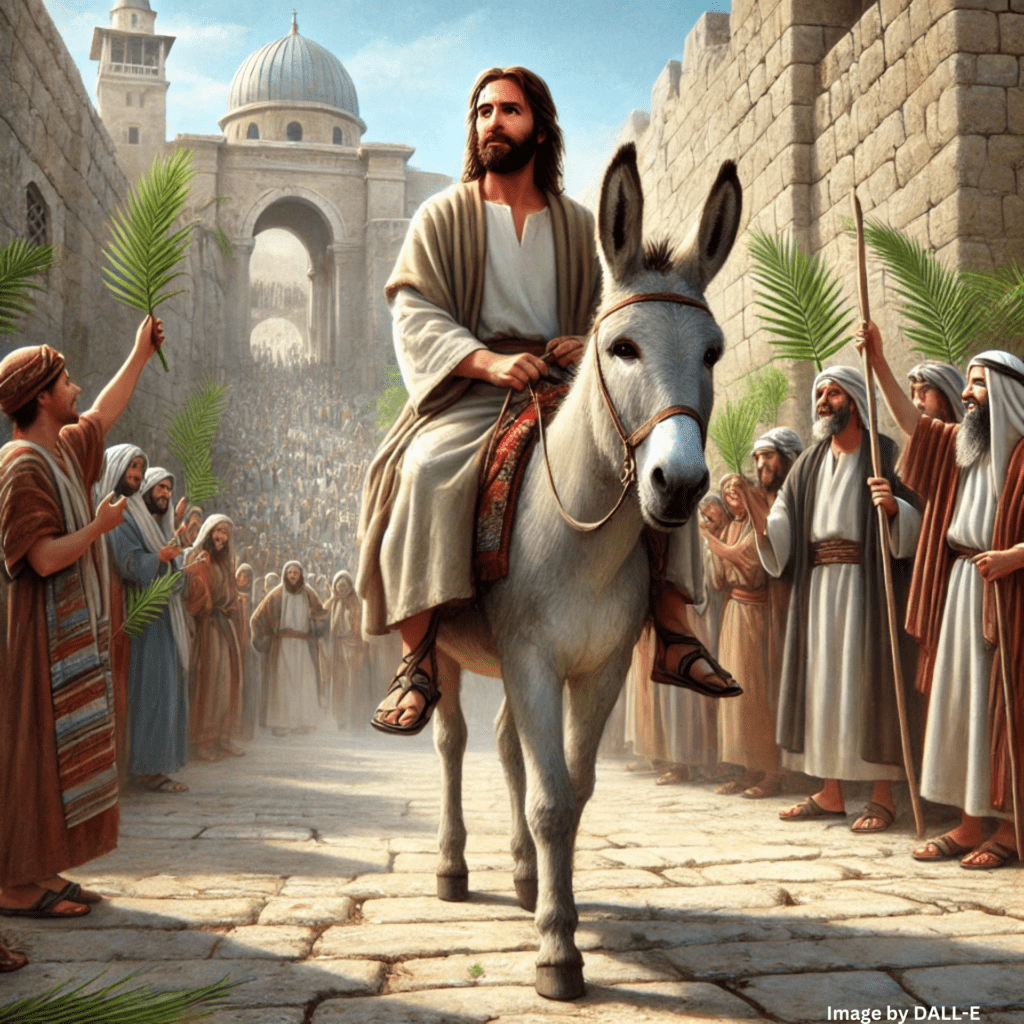The streets of Jerusalem buzz with anticipation. A crowd gathers, their hands gripping freshly cut palm branches. Whispers race through the throng: “He’s coming! The one they call the Messiah!” Children scramble for better views. The air vibrates with possibility. As Jesus appears, mounted not on a war horse but a borrowed donkey, the crowd erupts. “Hosanna! Blessed is he who comes in the name of the Lord!” Palm branches wave frantically overhead, creating a rippling green canopy. Cloaks are thrown down, forming an impromptu royal carpet.
What these jubilant celebrants couldn’t know was that within a week, many would exchange their “Hosannas” for “Crucify him!” The triumph of Palm Sunday would lead directly to the tragedy of Good Friday. This stark juxtaposition invites us to look deeper at Palm Sunday—to recognize it as more revolutionary and unexpected than we typically acknowledge.
The Political Powder Keg
To understand Palm Sunday’s true significance, we must place ourselves in first-century Jerusalem. The city languished under Roman occupation, with imperial soldiers patrolling streets and enforcing harsh taxation. Jewish people longed for liberation, for the promised Messiah who would overthrow their oppressors and restore Israel’s glory.
Into this volatile environment, Jesus made a calculated choice: entering Jerusalem on a donkey. This wasn’t simply humble transportation—it was deliberate symbolism, fulfilling Zechariah’s prophecy: “Behold, your king is coming to you; righteous and having salvation is he, humble and mounted on a donkey” (Zechariah 9:9).
The crowds immediately recognized this messianic imagery. Their shouts of “Hosanna” (literally “save us now”) and “Blessed is the king who comes in the name of the Lord” weren’t merely religious platitudes—they were politically dangerous declarations. To Roman ears, these were treasonous claims about a rival king. To the religious authorities, they threatened the delicate power balance they’d negotiated with Rome. No wonder the Pharisees urged Jesus to silence his supporters.
The Upside-Down Kingdom

Yet Jesus was inaugurating a revolution utterly different from what anyone expected. While Roman officials commanded impressive military parades with polished armor gleaming in the sun, Jesus orchestrated a procession featuring a borrowed donkey and peasants waving tree branches. Where imperial power projected strength through violence, Jesus embodied strength through vulnerability.
This upside-down approach confused everyone. The crowds expected Jesus to march to the governor’s palace or rally supporters at the Temple. Instead, He simply looked around and left for Bethany as evening approached. His followers anticipated immediate political action; religious leaders feared an uprising. No one expected what Jesus actually intended—a spiritual revolution that would begin with surrender, sacrifice, and apparent defeat.
The crowd’s expectations reveal our own tendency to misunderstand spiritual revolution. They wanted immediate results, tangible victory, and freedom from external oppression. Jesus offered something more profound but less immediately satisfying: freedom from sin, transformation of the heart, and a kingdom “not of this world.”
The Modern Palm Branch
Two thousand years later, we still misunderstand the nature of Jesus’s revolution. Like the Palm Sunday crowd, we often approach our faith with misaligned expectations. We wave our modern “palm branches” in celebration when Jesus seems to align with our desires:
∙ When blessings flow easily, we shout “Hosanna!”
∙ When prayers bring immediate results, we spread our cloaks.
∙ When Jesus’s teachings conveniently match our political preferences, we crown Him king.
But what happens when the donkey turns toward Calvary instead of the palace? When blessing requires sacrifice? When Jesus challenges rather than confirms our assumptions?
Too often, like the Jerusalem crowd, our devotion wavers when Jesus defies our expectations. We may not shout “Crucify Him!” but we might quietly set aside aspects of His teaching that challenge our comfort or convenience. We celebrate the King who offers salvation but hesitate to follow the Servant who calls us to sacrifice.
A Different Revolution
Palm Sunday invites us into a revolution that begins within before transforming the world around us. It challenges us to examine what kind of “King” we’re truly seeking. Are we looking for a Jesus who reinforces our existing views and blesses our predetermined plans? Or are we open to the Jesus who overturns tables in the temple of our hearts and calls us to unexpected paths?
As Holy Week approaches, Palm Sunday offers an opportunity for honest reflection. Perhaps we might ask:
∙ What expectations am I bringing to Jesus?
∙ Where have I misunderstood the nature of His kingdom?
∙ Am I willing to follow this King even when His path leads through difficulty?
The revolution of Palm Sunday remains as countercultural today as it was two millennia ago—a King who conquers through surrender, whose power is perfected in weakness, whose crown was made of thorns. It reminds us that Jesus doesn’t validate the world’s systems or our own comfort; He transforms them entirely.
So grab your palm branch and join the procession. But be prepared—this King and His unexpected revolution might take you places you never anticipated. That’s the persistent paradox of Palm Sunday: the triumph that leads to surrender, the victory that comes through sacrifice, and the King who rules by serving. The question remains: are we ready for this kind of revolution?

***
Learn more about Jesus’s revolution by reading the Bible, the story of the cosmic war between the powers of good and evil. If you’d like to get the big picture of the story in a couple of hours, check out my book The Bible in Brief.


Here are links to my blog indexes, which will make it quick and easy for you to find another post to read.
∙ Blogs with a Spiritual Theme
∙ Blogs about Books I Like: Fiction
∙ Blogs about Books I Like: Nonfiction
∙ Blogs for Holidays and Other Special Days
∙ Miscellaneous Blogs
